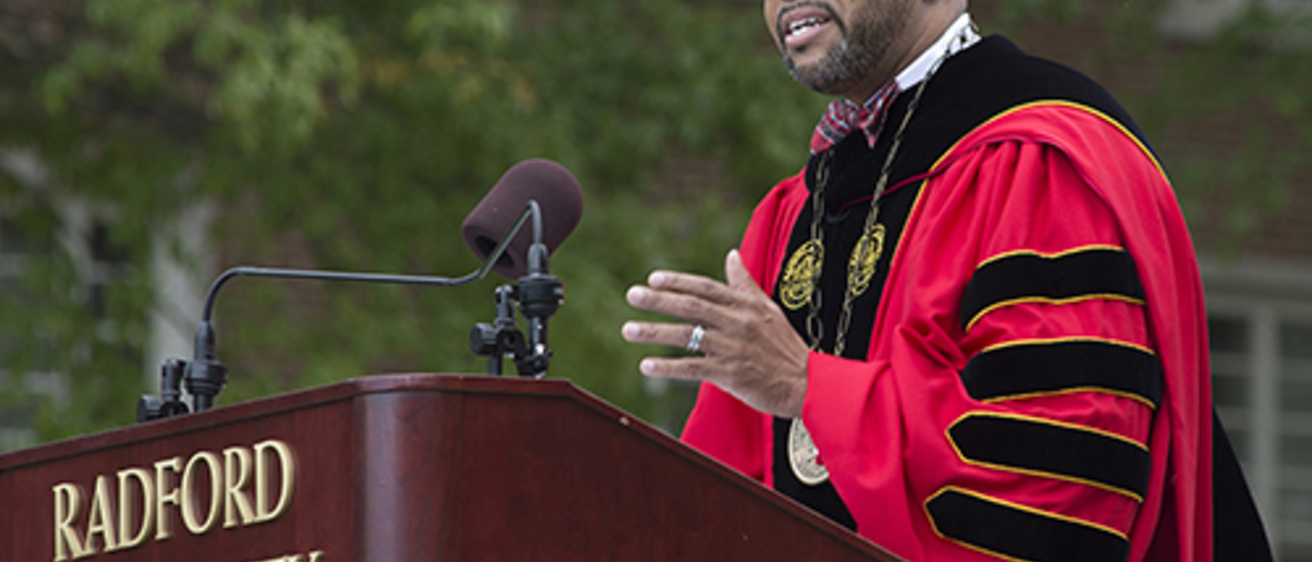By Andy Goodell
The College of Education produces leaders across a wide spectrum of professions. Among those success stories is that of Brian Hemphill (PhD ’98) of Spring Hope, North Carolina.
Hemphill assumed the presidency of Radford University in July 2016, a comprehensive public university of more than 9,400 students in Radford, Virginia. Along the way, he served in many leadership roles in the field of education. Throughout this journey, Hemphill has not forgotten the powerful and enriching experience he had at the University of Iowa College of Education.
As a Ph.D. candidate, Hemphill says he learned many important lessons about what it means to be a leader in the field of education. In particular, he recognized the importance of the individuals that make up any educational organization. This idea was driven home for Hemphill by Associate Professor Chet Rzonca. In conjunction with that concept was the idea of engaging people, a valuable approach that Hemphill learned from the late Professor Robert Engel.
“It’s about the people,” says Hemphill. “I also learned about the importance of creating a shared vision for an organization. If you lack the ability to help people believe in that vision, it won’t go very far. You have to be able to trans-form it into a shared vision.”
The statistics and outcomes associated with scholarly research are always important to great leaders. Hemphill credits Professor Ernest Pascarella with teaching him the value of research, data, and how these elements drive decisions.
“I have to make tough decisions every day,” says Hemphill. “The University of Iowa taught me that it’s important to utilize data to provide the full picture of any situation. I’ve not lost that particular belief since I left that great institution.”
While earning his Ph.D. through the College of Education’s Department of Educational Policy and Leadership Studies, Hemphill says he was encouraged to bring his best to the table every day. Not only that, but he gained lifelong friendships from the experience. While at the college, Hemphill befriended fellow Ph.D. student John Jones (MA ’94; PhD ’97), a man who would go on to become Vice President of Student Affairs at The University of Alabama at Birmingham.
Hemphill, along with his wife, Marisela Rosas Hemphill (PhD ’10), and Jones and his wife Holly Holiday Jones (BA ‘94; MA ’97), return to Iowa City at the onset of each Hawkeye football season, when the weather is still warm, to attend a game at Kinnick Stadium.
Prior to becoming president of Radford University, Hemphill served in many different capacities at several educational institutions. He was associate chancellor and dean of students at the University of Arkansas, vice president for student affairs and enrollment management at Northern Illinois University, and president of West Virginia State University. He served as an associate professor at Northern Illinois University and a professor at West Virginia State University.
Having built a great deal of the founding philosophy of his career at UI, Hemphill has also distinguished himself as an accomplished researcher. He’s provided scholarly perspectives pertinent to the higher education environment, including those related to threat preparedness on college campuses, economic issues related to education, STEM, and emerging financial concerns affecting the collegiate sphere.
Hemphill is a regarded keynote speaker, regularly serving as a guest presenter and panelist on numerous topics at events across the U.S. Recently, Hemphill co-edited the book, “College in the Cross-hairs: An Administrative Perspective on Prevention of Gun Violence.” He notes that his interest in researching gun violence stems from the experience of being vice president for student affairs and enrollment management when the Feb. 14, 2008 shooting at Northern Illinois University took the lives of several people and injured many others.
“It’s a very personal topic for me,” says Hemphill. “My advice to researchers is to make sure you write on topics that you are interested in, that are part of your passion. The topic must have meaning for you. I write about issues and things that really speak to me on a personal level.”
